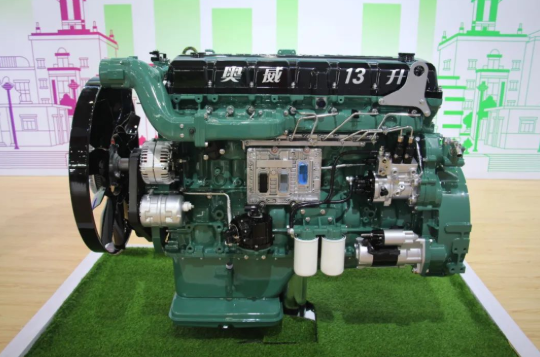Mar. 22, 2022
As a diesel engines manufacturer, we will introduce you the most fuel-efficient diesel engines for you!
How do you judge the merits of an diesel engine? Power, economy, reliability, etc. are all factors to be considered, but one of the key advantages that users are most concerned about is "fuel efficiency".
Both gas and diesel engines use internal combustion engines. In this type of engine, air enters the engine and combines with fuel. The engine's cylinders compress the resulting mixture, which ignites to trigger the movement of the pistons and crankshaft. The latter component activates the vehicle's transmission to turn the car's wheels. The piston then moves back to its original position and exhaust gases are expelled from the engine through the exhaust pipe. This process occurs several times per second.
The ignition process differs for gas and diesel engines. During compression, a spark plug ignites the fuel in a gas engine. Diesel engines have no spark plugs and simply use extreme compression to generate the heat needed for spontaneous ignition, also known as compression ignition. When this happens in a gas engine, it can damage the engine. Engines with more cylinders provide more power and run more smoothly than engines with fewer cylinders. However, these more powerful engines are also less efficient and more complicated to fix.
Customers who drive many miles on the highway often prefer diesel engines because they are more efficient than gasoline engines on these roads. Diesel fuel contains more energy per gallon than gas fuel, which makes it more economical overall. Diesel engines are still more efficient than gas engines, but less efficient for those who do mostly city driving. Diesel vehicles also have more torque, which will result in better fuel economy and more impressive acceleration.
It is important to remember that certain types of diesel can have a negative impact on vehicle performance. These include black diesel, biodiesel and other enhanced diesel products.
For most US consumers, diesel fuel and natural gas fuel cost roughly the same. Sometimes the price of diesel is higher than the price of natural gas, and other times it is lower than the cost of natural gas. But even if you spend more on diesel, you can still get more economy out of your diesel engine over the life of your vehicle. This is because you need an 8 litre gas engine to get the same power as a 6 litre diesel engine.
Diesel engines tend to be more durable, last longer, run reliably and require minimal maintenance than gas engines. Although diesel cars used to be much heavier than gas cars of the same size, thanks to modern manufacturing methods this is no longer an issue.
Diesel engines also have fewer components than gas engines, which means there are fewer potential parts for your car to break down. Most diesel engines require fewer repairs and maintenance services than gas engines, which represents an overall economic saving.

How efficient are diesel engines?
There has been a big improvement - from efficiency of around 35% in the 1980s to 50% today. This means that half of the fuel is now put into useful mechanical work. For reference - the efficiency of petrol engines is around 35%. These gains come from high-pressure common rail fuel injection systems, turbocharging and the introduction of computing power to precisely control combustion and after-treatment management systems.
Is improved fuel efficiency the number one demand of customers?
Yes, good fuel efficiency is the most important factor, but customers also need good engine performance and durability. And then it must be durable and meet emissions requirements - these are sometimes competing with each other.
Are engines becoming more powerful too?
There is an upward trend - customers are moving larger loads, which require more power. The Volvo Group's maximum output is now 1,000 hp. However, all heavy-duty applications are still (relatively) underpowered compared to passenger cars.
The diesel engine has been accused of being environmentally unfriendly. Can it be made clean and environmentally friendly?
It is possible to make diesel engines very clean, something that the heavy-duty industry has made more progress with than the light-duty industry. Part of the reason for this is that heavy industry customers demand much higher efficiency.
How difficult is it to increase the efficiency of diesel engines while reducing emissions?
Improving thermodynamic processes to compensate for the burden of adding SCR aftertreatment systems has always been a challenge. But now we are back on track to progressively improve efficiency.
How can we further reduce diesel engine fuel consumption and improve fuel efficiency?
The next important step in improving engine efficiency/reducing fuel consumption is to combine it with electric vehicles. The demand for engines in the future will not be as variable as it is today. There is a difference between the efficiency of an engine in its "optimum position" and its efficiency over its entire practical operating range. Pairing an engine with an electric motor, for example in a parallel hybrid, allows the engine to operate at the most efficient level. There is no doubt that electrification will be part of the future solution for combustion drivetrains.
What is the maximum efficiency an engine can achieve?
Theoretical system efficiencies for diesel engines range from 55-60%. For reference, the best power stations run at 50-55% efficiency and fuel cells are more than 50% efficient, so diesel engines can be incredibly efficient. This, coupled with the fact that engines using electrification will typically have lower power requirements, means that fuel use will decline in the future.
The formula you need is as follows.
Miles / (city MPG * % of miles you drive in the city + highway MPG * % of miles you drive on the highway) * $ per gallon = annual gasoline cost
When you do your own calculations on these numbers, you may find that while diesel fuel costs less per mile than gasoline, it takes many years to break even on a vehicle if you compare the cost of a diesel vehicle to the cost of gasoline power. However, if you drive many miles a year on the motorway and plan to use a diesel vehicle for the long term, you may find that paying upfront for a more efficient engine makes sense, especially when you consider your annual fuel costs.
Also, remember that the break-even point for a diesel car can change if you change the percentage of city miles versus motorway miles, or if you drive more or less miles per year than you expect. Drivers who drive less than 10,000 miles per year on average will not be able to limit their fuel costs enough to make economic sense with a diesel engine unless they rarely drive in the city or currently drive a vehicle that requires premium gas.
Recently, the award ceremony of the Discover Trusted China Truck User Survey and Award was held in Nanjing by ChinaTruck.com.
After the preliminary screening and the final strict evaluation, the ALLWIN CA6DM3 engine produced by FAWDE was selected from dozens of candidates and won the 2022 Trusted Fuel Efficient Heavy Duty Engine Award, which is also the fifth time that the ALLWIN CA6DM3 engine has won this honor.
As an important member of China FAW's independent system and a leading enterprise in China's internal combustion engine industry, FAWDE has been committed to independent innovation to master key core technologies, providing high-end power for national automobile brands with innovative technologies and promoting harmonious, green and sustainable development of society.
With the implementation of China's sixth stage of motor vehicle pollutant emission standards, FAWDE has applied its self-developed super-efficient combustion control technology, integrated electronically controlled high-pressure common rail technology, ultra-high burst pressure technology, high-efficiency gas exchange technology and other top ten core technologies for fuel saving to the product design and manufacturing process, making the products exhibit even better fuel-saving performance.
The ALLWIN CA6DM3 engine has the lowest fuel consumption of 183g/kW.h, and the fuel consumption in common working conditions is lower than 190g/kW.h. The whole vehicle has a wide range of low fuel consumption revolutions, and the fuel consumption of 100km is 2 to 3L lower than that of competing products, which highlights the advantages of fuel saving, while the power and reliability also reach the industry leading level.
Wu Qianqiang, a Jiefang heavy truck user in China, says: "FAWDE with Jiefang heavy trucks is more fuel-efficient than other trucks." According to the introduction, the Jiefang J6P Pilot Edition heavy truck he is currently driving is equipped with the ALLWIN CA6DM3 engine, which not only has a high output, pulls more and runs faster, but also has good fuel-saving characteristics, with an average fuel consumption of about 26.9 litres per 100 kilometres, which can save more than RMB 6,000 per month and nearly RMB 80,000 per year compared to the vehicles driven by other truck driving friends around him.
The ALLWIN CA6DM3 engine, bearing the advanced technology of independent research and development, inherits the excellent genes of FAWDE, and has won the general trust and high recognition of customers with its outstanding advantages of fuel saving.

If you want to know more about high-efficiency diesel engines, you can contact us!
Tel.: +86 510 8501 4990 ext.8356
Mob.: +86 13914166873
Fax: +86 510 8599 7974
E-mail: info_fawde@fawde.com.cn
Add.: 98# Yongle East Road, Wuxi, Jiangsu, China.